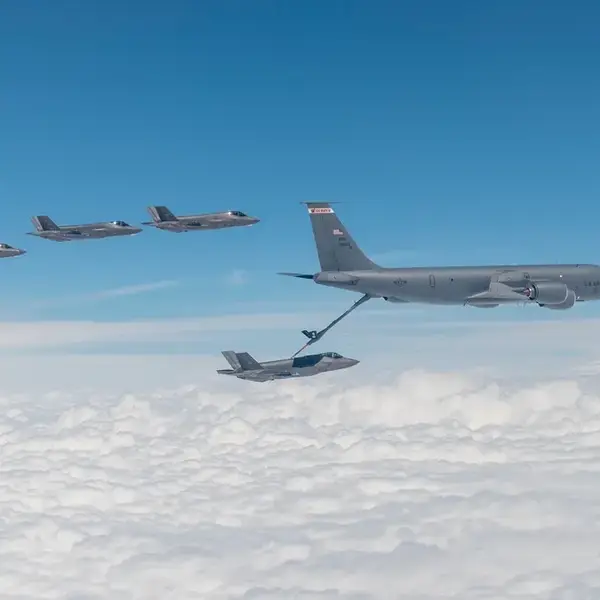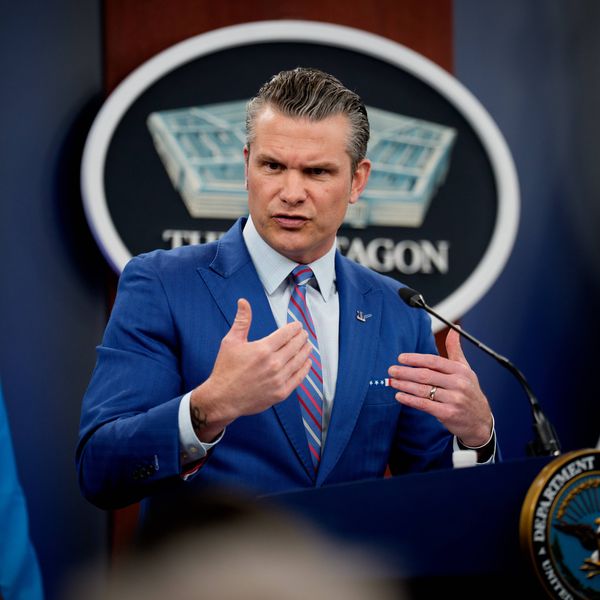
Members of Afghanistan's U.S.-trained 777 Special Mission Wing prepare for a helicopter flight during a visit by Chief of General Staff of the Armed Forces Gen. Mohammad Yasin Zia at their base in Kabul, Afghanistan, Wednesday, April 28, 2021. (Photo: Marcus Yam, Los Angeles Times via Getty Images)
Congress Urged to Divert Pentagon Dollars After Afghan Withdrawal Towards Social Uplift, Climate Emergency
"The real security challenges of today—from the climate crisis to global inequality—demand that we cut the Pentagon budget and invest instead in human needs," said one peace advocate who backed a letter to U.S. lawmakers.
Noting that the United States spends more on its military than the next 11 nations combined, and that tens of billions of dollars will be freed up due to the U.S. withdrawal from Afghanistan, 40 advocacy groups led by Public Citizen sent a letter Friday to congressional defense appropriations leaders calling for a lower Pentagon budget for fiscal year 2022.
"The administration's proposed budget would provide the Department of Defense with more money than the Departments of State, Justice, Education, Transportation, Health and Human Services, and the Environmental Protection Agency combined."
--groups' letter
"The Biden administration's recently announced troop withdrawal from Afghanistan offers an opportunity to re-examine the nation's extremely large commitments to the Pentagon budget," the letter (pdf) states. "We are dismayed that the administration's initial budget blueprint to Congress did not reflect a corresponding reduction in war funds, and instead included a gargantuan request of $753 billion for the Pentagon and affiliated spending."
"We urge the congressional defense appropriations subcommittees to appropriate a lower topline than initially requested by the Biden administration to, at a minimum, reflect cost savings from withdrawing troops from Afghanistan," it continues. "Estimates indicate that at least $20 billion and perhaps as much as $50 billion will be freed up by withdrawing troops from Afghanistan. Yet the administration requested a 1.7% increase from the previous fiscal year, adding $13 billion in discretionary spending to an already sky-high figure."
\u201c"The increase alone in Pentagon spending is more than the entire budget for diplomatic programs at the State Department - despite the fact that robust diplomacy in Afghanistan will be needed both during and after the troop withdrawal," https://t.co/LX7xdfkpRj\u201d— Veterans For Peace (@Veterans For Peace) 1621613823
The letter notes that "the Stockholm International Peace Research Institute reported that the United States spent more on its military last year than the next 11 nations combined, a whopping 39% of global military spending in 2020. If enacted, the administration's proposed budget would provide the Department of Defense with more money than the Departments of State, Justice, Education, Transportation, Health and Human Services, and the Environmental Protection Agency combined."
"The increase alone in Pentagon spending is more than the entire budget for diplomatic programs at the State Department--despite the fact that robust diplomacy in Afghanistan will be needed both during and after the troop withdrawal," it adds.
The letter's signatories asserted that taxpayer dollars would be better spent on priorities including reducing inequality and combatting the climate emergency.
"Reducing the Pentagon budget to reflect the savings from ending the Afghan War is just common sense," said Public Citizen president Robert Weissman. "The Pentagon has no claim on the money that will no longer be spent on that failed war, the taxpayers do."
"Given the outrageous bloat, waste, mismanagement, and misdirected resources in the Pentagon budget, as well as the long list of underfunded domestic and human needs, the savings from ending the Afghan war--variously estimated at $20-$50 billion a year--should be devoted to nonmilitary priorities to make our nation safer, more secure, and more just," he added.
\u201c\ud83d\udea8CODEPINK joined 39 organizations calling on Congress to redirect billions of dollars in savings from troop withdrawal in Afghanistan to social services and human needs. \n\nRead the full statement here: \nhttps://t.co/dvvirWMt3m\u201d— CODEPINK (@CODEPINK) 1621615977
Erica Fein, advocacy director at Win Without War, said that President Joe Biden's decision to "finally withdraw U.S. forces from Afghanistan after 20 long years of war is a major, welcome step in the right direction. But that alone is not enough. If we're serious about not just ending our current wars, but ending the endless war mentality that brought us there, we need our budget to reflect that."
"The real security challenges of today--from the climate crisis to global inequality--demand that we cut the Pentagon budget and invest instead in human needs," Fein added.
Diana Ohlbaum, legislative director for foreign policy at the Friends Committee on National Legislation, asserted that "endless wars mean endless Pentagon spending, and vice versa. Now that the U.S. war in Afghanistan is finally coming to a close, Americans deserve to have the savings spent on something that will actually make all of us more secure, such as bold measures to address global pandemics, climate change, and racial injustice."
An Urgent Message From Our Co-Founder
Dear Common Dreams reader, The U.S. is on a fast track to authoritarianism like nothing I've ever seen. Meanwhile, corporate news outlets are utterly capitulating to Trump, twisting their coverage to avoid drawing his ire while lining up to stuff cash in his pockets. That's why I believe that Common Dreams is doing the best and most consequential reporting that we've ever done. Our small but mighty team is a progressive reporting powerhouse, covering the news every day that the corporate media never will. Our mission has always been simple: To inform. To inspire. And to ignite change for the common good. Now here's the key piece that I want all our readers to understand: None of this would be possible without your financial support. That's not just some fundraising cliche. It's the absolute and literal truth. We don't accept corporate advertising and never will. We don't have a paywall because we don't think people should be blocked from critical news based on their ability to pay. Everything we do is funded by the donations of readers like you. Will you donate now to help power the nonprofit, independent reporting of Common Dreams? Thank you for being a vital member of our community. Together, we can keep independent journalism alive when it’s needed most. - Craig Brown, Co-founder |
Noting that the United States spends more on its military than the next 11 nations combined, and that tens of billions of dollars will be freed up due to the U.S. withdrawal from Afghanistan, 40 advocacy groups led by Public Citizen sent a letter Friday to congressional defense appropriations leaders calling for a lower Pentagon budget for fiscal year 2022.
"The administration's proposed budget would provide the Department of Defense with more money than the Departments of State, Justice, Education, Transportation, Health and Human Services, and the Environmental Protection Agency combined."
--groups' letter
"The Biden administration's recently announced troop withdrawal from Afghanistan offers an opportunity to re-examine the nation's extremely large commitments to the Pentagon budget," the letter (pdf) states. "We are dismayed that the administration's initial budget blueprint to Congress did not reflect a corresponding reduction in war funds, and instead included a gargantuan request of $753 billion for the Pentagon and affiliated spending."
"We urge the congressional defense appropriations subcommittees to appropriate a lower topline than initially requested by the Biden administration to, at a minimum, reflect cost savings from withdrawing troops from Afghanistan," it continues. "Estimates indicate that at least $20 billion and perhaps as much as $50 billion will be freed up by withdrawing troops from Afghanistan. Yet the administration requested a 1.7% increase from the previous fiscal year, adding $13 billion in discretionary spending to an already sky-high figure."
\u201c"The increase alone in Pentagon spending is more than the entire budget for diplomatic programs at the State Department - despite the fact that robust diplomacy in Afghanistan will be needed both during and after the troop withdrawal," https://t.co/LX7xdfkpRj\u201d— Veterans For Peace (@Veterans For Peace) 1621613823
The letter notes that "the Stockholm International Peace Research Institute reported that the United States spent more on its military last year than the next 11 nations combined, a whopping 39% of global military spending in 2020. If enacted, the administration's proposed budget would provide the Department of Defense with more money than the Departments of State, Justice, Education, Transportation, Health and Human Services, and the Environmental Protection Agency combined."
"The increase alone in Pentagon spending is more than the entire budget for diplomatic programs at the State Department--despite the fact that robust diplomacy in Afghanistan will be needed both during and after the troop withdrawal," it adds.
The letter's signatories asserted that taxpayer dollars would be better spent on priorities including reducing inequality and combatting the climate emergency.
"Reducing the Pentagon budget to reflect the savings from ending the Afghan War is just common sense," said Public Citizen president Robert Weissman. "The Pentagon has no claim on the money that will no longer be spent on that failed war, the taxpayers do."
"Given the outrageous bloat, waste, mismanagement, and misdirected resources in the Pentagon budget, as well as the long list of underfunded domestic and human needs, the savings from ending the Afghan war--variously estimated at $20-$50 billion a year--should be devoted to nonmilitary priorities to make our nation safer, more secure, and more just," he added.
\u201c\ud83d\udea8CODEPINK joined 39 organizations calling on Congress to redirect billions of dollars in savings from troop withdrawal in Afghanistan to social services and human needs. \n\nRead the full statement here: \nhttps://t.co/dvvirWMt3m\u201d— CODEPINK (@CODEPINK) 1621615977
Erica Fein, advocacy director at Win Without War, said that President Joe Biden's decision to "finally withdraw U.S. forces from Afghanistan after 20 long years of war is a major, welcome step in the right direction. But that alone is not enough. If we're serious about not just ending our current wars, but ending the endless war mentality that brought us there, we need our budget to reflect that."
"The real security challenges of today--from the climate crisis to global inequality--demand that we cut the Pentagon budget and invest instead in human needs," Fein added.
Diana Ohlbaum, legislative director for foreign policy at the Friends Committee on National Legislation, asserted that "endless wars mean endless Pentagon spending, and vice versa. Now that the U.S. war in Afghanistan is finally coming to a close, Americans deserve to have the savings spent on something that will actually make all of us more secure, such as bold measures to address global pandemics, climate change, and racial injustice."
Noting that the United States spends more on its military than the next 11 nations combined, and that tens of billions of dollars will be freed up due to the U.S. withdrawal from Afghanistan, 40 advocacy groups led by Public Citizen sent a letter Friday to congressional defense appropriations leaders calling for a lower Pentagon budget for fiscal year 2022.
"The administration's proposed budget would provide the Department of Defense with more money than the Departments of State, Justice, Education, Transportation, Health and Human Services, and the Environmental Protection Agency combined."
--groups' letter
"The Biden administration's recently announced troop withdrawal from Afghanistan offers an opportunity to re-examine the nation's extremely large commitments to the Pentagon budget," the letter (pdf) states. "We are dismayed that the administration's initial budget blueprint to Congress did not reflect a corresponding reduction in war funds, and instead included a gargantuan request of $753 billion for the Pentagon and affiliated spending."
"We urge the congressional defense appropriations subcommittees to appropriate a lower topline than initially requested by the Biden administration to, at a minimum, reflect cost savings from withdrawing troops from Afghanistan," it continues. "Estimates indicate that at least $20 billion and perhaps as much as $50 billion will be freed up by withdrawing troops from Afghanistan. Yet the administration requested a 1.7% increase from the previous fiscal year, adding $13 billion in discretionary spending to an already sky-high figure."
\u201c"The increase alone in Pentagon spending is more than the entire budget for diplomatic programs at the State Department - despite the fact that robust diplomacy in Afghanistan will be needed both during and after the troop withdrawal," https://t.co/LX7xdfkpRj\u201d— Veterans For Peace (@Veterans For Peace) 1621613823
The letter notes that "the Stockholm International Peace Research Institute reported that the United States spent more on its military last year than the next 11 nations combined, a whopping 39% of global military spending in 2020. If enacted, the administration's proposed budget would provide the Department of Defense with more money than the Departments of State, Justice, Education, Transportation, Health and Human Services, and the Environmental Protection Agency combined."
"The increase alone in Pentagon spending is more than the entire budget for diplomatic programs at the State Department--despite the fact that robust diplomacy in Afghanistan will be needed both during and after the troop withdrawal," it adds.
The letter's signatories asserted that taxpayer dollars would be better spent on priorities including reducing inequality and combatting the climate emergency.
"Reducing the Pentagon budget to reflect the savings from ending the Afghan War is just common sense," said Public Citizen president Robert Weissman. "The Pentagon has no claim on the money that will no longer be spent on that failed war, the taxpayers do."
"Given the outrageous bloat, waste, mismanagement, and misdirected resources in the Pentagon budget, as well as the long list of underfunded domestic and human needs, the savings from ending the Afghan war--variously estimated at $20-$50 billion a year--should be devoted to nonmilitary priorities to make our nation safer, more secure, and more just," he added.
\u201c\ud83d\udea8CODEPINK joined 39 organizations calling on Congress to redirect billions of dollars in savings from troop withdrawal in Afghanistan to social services and human needs. \n\nRead the full statement here: \nhttps://t.co/dvvirWMt3m\u201d— CODEPINK (@CODEPINK) 1621615977
Erica Fein, advocacy director at Win Without War, said that President Joe Biden's decision to "finally withdraw U.S. forces from Afghanistan after 20 long years of war is a major, welcome step in the right direction. But that alone is not enough. If we're serious about not just ending our current wars, but ending the endless war mentality that brought us there, we need our budget to reflect that."
"The real security challenges of today--from the climate crisis to global inequality--demand that we cut the Pentagon budget and invest instead in human needs," Fein added.
Diana Ohlbaum, legislative director for foreign policy at the Friends Committee on National Legislation, asserted that "endless wars mean endless Pentagon spending, and vice versa. Now that the U.S. war in Afghanistan is finally coming to a close, Americans deserve to have the savings spent on something that will actually make all of us more secure, such as bold measures to address global pandemics, climate change, and racial injustice."

